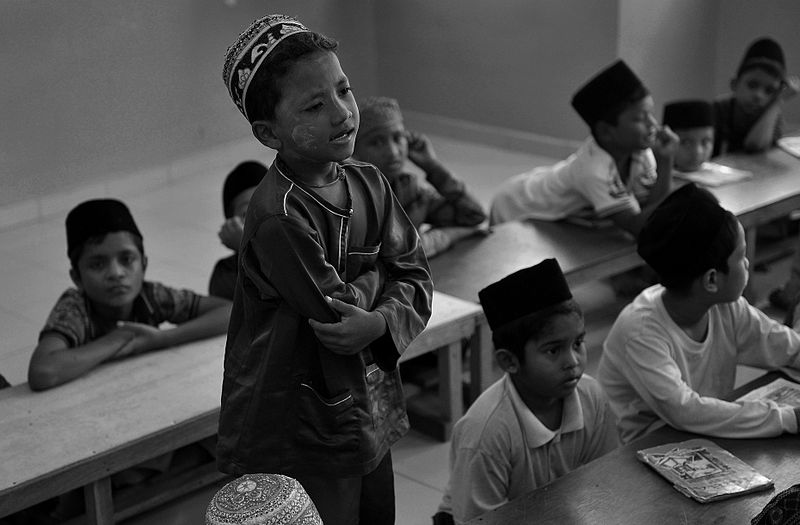Here are some significant facts about the Rohingya people, who have lived in Myanmar (Burma) since the ninth century or since the end of the Second World War, depending on whether you believe them or the government of Myanmar:
- They are Muslim, while most Burmese are Buddhists.
- They are regularly harassed, detained, beaten, raped and killed by the Burmese army.
- Approximately 650,000 have been driven out of their homes and villages, many becoming refugees in Bangladesh or India.
- Aung San Suu Kyi, who won the Nobel Peace Prize in 1991, has never said a word about them, at least not for publication.
- Most of the weapons that are killing them and destroying their villages are sold to the Burmese Army by the State of Israel.
They have become a subject of international concern. The Burmese, along with most of the rest of the world, loudly deplore the violence that has destroyed Rohingya villages and slaughtered so many and made so many refugees. These are not guerrillas or dissidents but ordinary citizens — at least they were citizens until 1982, when the Burmese state stripped them of citizenship, claiming they were not one of the eight protected minorities.
Most Rohingya lived in Rakhine state (Arakan, in Burmese), in the far southwest of the country, bordering on the Bay of Bengal. They speak a language of their own, though most speak Burmese as well.
For more than 30 years, a million Rohingyas have lived in Burma, with steadily diminishing rights and quality of life. Burmese soldiers, along with freelance gangsters and human traffickers, have abused them, destroyed their homes and detained them without cause, and because they have no legal status they have no recourse. And what is shocking to Western eyes, Buddhist monks have taken part in the abuse.
Their situation reminds many of the Jews in Hitler’s Germany. Like the Jews, Rohingya and other minorities serve as scapegoats for the Burmese and are blamed for every difficulty. The Burmese claim they are immigrants from Bangladesh — they are even called, disparagingly, “Bengalis” — and when their homes and villages are destroyed, they are settled in makeshift refugee camps. On the contrary, say the Rohingya, they have lived in Burma for centuries. It is difficult to verify either narrative, because in Burma — as in many countries — archaeological findings are highly politicized, and there is little agreement on what constitutes evidence.
Aung San Suu Kyi, Burma’s distinguished State Counselor and leader of the National League for Democracy, has refused to intervene in the persecution of the Rohingya or any other minority group. International outrage appears to have no effect on the continuing violence. The United Nations Commissioner for Human Rights has called it a “textbook example” of ethnic cleansing, and some say it echoes the Nazis’ efforts to render their fatherland Judenrein, cleansed of Jews. The longstanding persecution of Rohingya reminds others of the treatment of Palestinians in Israel, especially in the Occupied Territories.
Recently I saw an article about a small community of Rohingya refugees settling in Rogers Park, a neighbourhood on the North side of Chicago. When I lived on the South side 50 years ago, it was a Jewish enclave; then the delis gave place to rib joints and then to taco shops. What food will the Rohingya bring?
North American Jews especially raise their voices, raise money and demonstrate for an end to the violence in Burma, or Myanmar. But they don’t use their considerable influence to call on the Israeli government to stop selling weapons to the Burmese Army.
There are international agencies that send aid to the Rohingya, notably Islamic Relief. In early October, the local contact for Islamic Relief, Mrs. Fatima Benhatta, invited representatives of Independent Jewish Voices Canada to attend a fundraiser for the Rohingya. The lavish event took place in a ballroom in the Vancouver suburb of Surrey, a heavily South Asian town, and featured hors d’oeuvres, many speeches and a fundraising pitch, followed by a festive dinner, served at about 10 p.m.
Among the guests were clergy of several faiths, Members of the Legislative Assembly (MLAs), municipal officials and United Nations representatives, including the keynote speaker, George Summerwill, a longtime UN employee who has served throughout Asia and now lives in Vancouver. He spoke of Burma’s troubled recent history, placing the current crisis of the Rohingya in context. A moving film about the refugees was shown, featuring the terrible, familiar images of starving children and hollow-eyed adults.
The fundraising portion of the evening’s program opened with a call for donations of $10,000. I cannot say for sure how much money was raised, but Islamic Relief clearly doesn’t mess around. Find more information here.
Martha Roth is a writer and editor and a founding member of Independent Jewish Voices Canada.
Editor’s note: The number of Rohingya people expelled has been updated to reflect an increased total since this article was first written.
Image: Wikimedia Commons
Like this article? Please chip in to keep stories like these coming.





